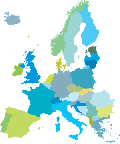Strong growth predicted in European EMR market
- 3 July 2007
 The market in electronic medical record systems across Europe may be set to treble over the next six years because of the strong business and clinical benefits such systems deliver, a new Frost and Sullivan report argues.
The market in electronic medical record systems across Europe may be set to treble over the next six years because of the strong business and clinical benefits such systems deliver, a new Frost and Sullivan report argues.
The report, titled European Electronic Medical Records Markets, says that the European EMR market is currently worth $349.6m and will reach $1.15bn by 2013.
Amongst the benefits of the solutions named by the analysts are improved efficiency and patient safety, better cost containment and the desire to provide integrated healthcare.
A Frost and Sullivan spokesperson told EHE: “The cost savings potential of EMR in both primary and hospital care is perhaps the most compelling factor driving its uptake, given that cost containment is a top priority for governments and providers alike.
“The time and costs associated with basic but essential activities such as creating and storing charts and employing adequate nursing and administrative staff for these purposes can be reduced significantly by adopting an EMR system.”
Frost and Sullivan research analyst, Kiran John, said: “Having accurate patient data plays a vital role in treating patients effectively, but this has always depended on maintaining comprehensive records of patients’ encounters with the medical system.
“EMR provides healthcare professionals and nursing and administrative staff instant access to the right information from multiple points, and EMR data can be sourced, accessed, edited, appended and maintained effortlessly.”
The report concludes that standardisation is the biggest issue shaping the pace of EMR adoption in Europe.
John said: “The possible requirement of standardisation and EMR certification is a topic of great interest today, with supporters of this drive citing complexity and fragmentation in the European markets as a compelling reason.”
The researchers say that EMR implementation has helped healthcare organisations attain exceptional operational efficiencies, but the process of transferring information is a tedious and sometimes discouraging one. This has led to a concerted standardisation drive in Europe to provide the highest levels of care delivery.
They add that the introduction of EMR has the potential to transform healthcare delivery as it ensures quicker response and shorter waiting times, swift reporting and scheduling and efficient record keeping.
John said: “EMR’s ability to quickly combat wastage of time in charting has been a key driver in promoting these solutions in the primary care sector."
However, the report warns that companies will need to ensure a high degree of involvement with governments and their key decision makers to ensure sustained growth of the EMR markets.
The report provides an overview of market dynamics and revenues, along with a complete analysis of key market drivers, restraints and trends in the following European countries: Germany, France, the United Kingdom, Italy, Spain, Scandinavia and Benelux.




